EHRI meets in Bucharest for its yearly assembly
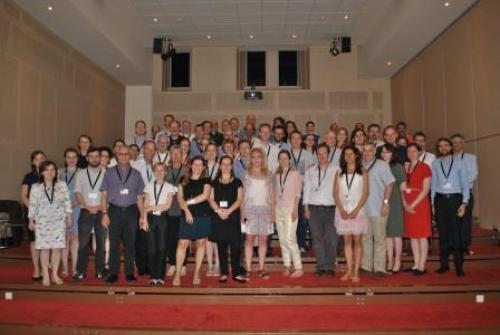
Once a year the people that work to make the European Holocaust Research Infrastructure (EHRI) a success all meet for a General Partner Meeting and several smaller working sessions. This year, on 21-23 June, the EHRI consortium of 23 partner institutions from 17 countries met in Bucharest, the city where hosting EHRI partner the Elie Wiesel National Institute for the Study of the Holocaust in Romania is based.
On 22 June over 60 people gathered in the Novotel in Bucharest to present and discuss the various plans, activities and results of EHRI in 2016 and 2017. There were sessions on:
- Data integration, services for archives and digital research
- Training, workshops and fellowships
- Dissemination, expansion, collaboration and sustainability
- Management
Welcome by Alexandru Florian
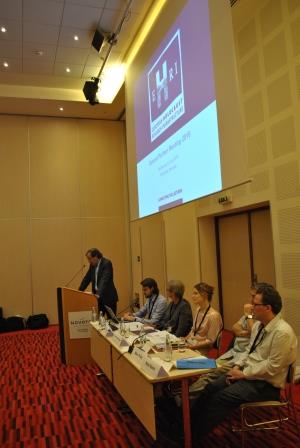 Alexandru Florian, the director of the Elie Wiesel National Institute for the Study of the Holocaust in Romania, started the meeting with a welcome speech. He reminded his audience that the Elie Wiesel Institute only recently had celebrated its 10 year anniversary. In 2003-2004, the president of Romania took the initiative to organize an International Commission for the Study of the Holocaust in Romania. The Commission concluded that the main perpetrator of the Holocaust in Romania was the government lead by Ion Antonescu. This was the first time the Romanian government accepted responsibility for its role and recognized the fate of the Holocaust victims. As a result of the recommendations of the Commission, the Elie Wiesel National Institute was founded in 2005. The Institute, coordinated by the Prime Minister, has a mandate to: develop interdisciplinary research about the tragedy of Jews and Roma, support projects of remembrance, and develop educational projects about the Holocaust. It also serves as a kind of “watchdog” against public manifestations of negationism, anti-Semitism or racism.
Alexandru Florian, the director of the Elie Wiesel National Institute for the Study of the Holocaust in Romania, started the meeting with a welcome speech. He reminded his audience that the Elie Wiesel Institute only recently had celebrated its 10 year anniversary. In 2003-2004, the president of Romania took the initiative to organize an International Commission for the Study of the Holocaust in Romania. The Commission concluded that the main perpetrator of the Holocaust in Romania was the government lead by Ion Antonescu. This was the first time the Romanian government accepted responsibility for its role and recognized the fate of the Holocaust victims. As a result of the recommendations of the Commission, the Elie Wiesel National Institute was founded in 2005. The Institute, coordinated by the Prime Minister, has a mandate to: develop interdisciplinary research about the tragedy of Jews and Roma, support projects of remembrance, and develop educational projects about the Holocaust. It also serves as a kind of “watchdog” against public manifestations of negationism, anti-Semitism or racism.
In 2015 the Elie Wiesel Institute became a partner in EHRI. Florian concluded his speech by stressing the importance of EHRI for Holocaust research in Romania: “I believe that [EHRI’s] objective to provide a platform to facilitate access to primary sources of the Holocaust is an extremely important one for knowledge but also for the dissemination of the information that until recently had only a specialized audience.”
EHRI is a human network
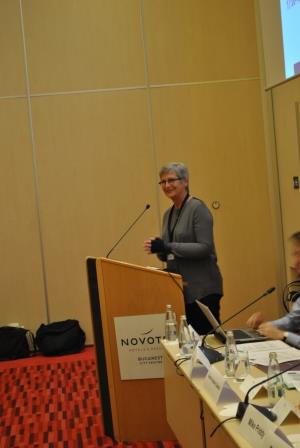 Looking at all the people assembled and the lively discussions going on in the room, project director Conny Kristel, who then opened the meeting, stressed once again that EHRI is very much a human network, where people work together to support Holocaust research.
Looking at all the people assembled and the lively discussions going on in the room, project director Conny Kristel, who then opened the meeting, stressed once again that EHRI is very much a human network, where people work together to support Holocaust research.
The human factor is certainly present in the EHRI training, workshop and fellowship programmes.
In 2016 EHRI started with a new, more flexible fellowship programme that offers fellowships not only to Holocaust researchers, but also to archivists and curators. A fellow can stay at one or more of the 15 participating institutions between 1 and 6 weeks. So far 21 fellows have been selected for 33 stays.
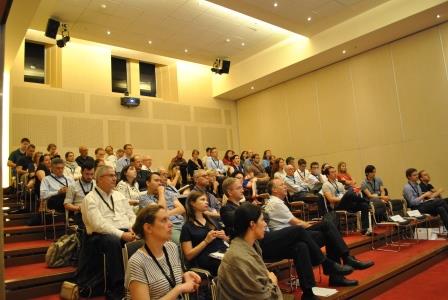 In addition to the existing EHRI online course material, new interactive online courses with learning groups are developed by EHRI partner Yad Vashem. These will later be joined by tutorials on archival sources and the EHRI Portal. Those present at the meeting received a preview of the new online course material which was very promising.
In addition to the existing EHRI online course material, new interactive online courses with learning groups are developed by EHRI partner Yad Vashem. These will later be joined by tutorials on archival sources and the EHRI Portal. Those present at the meeting received a preview of the new online course material which was very promising.
Finally, the programmes for up to ten methodological seminars and seven workshops were presented. The first EHRI seminar on “Languages, Cultures and Perspectives – How to Read Holocaust Sources”, took place shortly after the General Partner Meeting in Vilnius and was hosted by EHRI partner the Vilna Gaon State Jewish Museum. The first EHRI workshop on “Holocaust Archival Film Footage as a Historical Source” was organised by Yad Vashem in September. For these and other upcoming seminars and workshops, you can find the calls on this website.
EHRI Portal
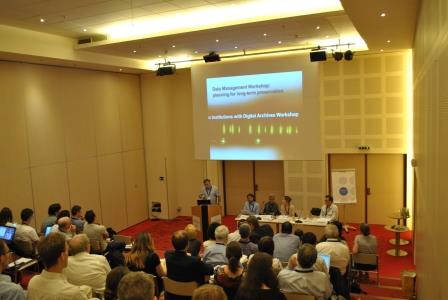 Another important aspect of the work of EHRI is the further development of the EHRI portal. The portal, that gives access to dispersed archival sources related to the Holocaust, was first launched in March 2015. Since then EHRI continues to connect more sources and to improve the usability. To this end, EHRI performs several usability tests, where participants try out parts of the portal. Results of the first test have been evaluated and will be acted upon in the coming period, thereby improving the functionality and design of the portal.
Another important aspect of the work of EHRI is the further development of the EHRI portal. The portal, that gives access to dispersed archival sources related to the Holocaust, was first launched in March 2015. Since then EHRI continues to connect more sources and to improve the usability. To this end, EHRI performs several usability tests, where participants try out parts of the portal. Results of the first test have been evaluated and will be acted upon in the coming period, thereby improving the functionality and design of the portal.
Furthermore, ambitious plans and workflows for adding further descriptions of Holocaust-relevant archival sources from many more institutions located across Europe and beyond were presented. Implementing these plans over the next three years will ensure that users of the portal can access an ever increasing amount of information about Holocaust archives and their collections.
Document blog
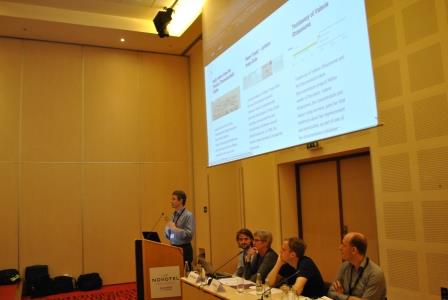 Connected to the portal is the EHRI Document Blog. This new initiative allows different institutions and EHRI fellows to highlight a document from their collection, offering extra information on people, places and events mentioned. The blog investigates new ways to present and interpret documents using new online and digital tools. The document blog has already received some very positive feedback.
Connected to the portal is the EHRI Document Blog. This new initiative allows different institutions and EHRI fellows to highlight a document from their collection, offering extra information on people, places and events mentioned. The blog investigates new ways to present and interpret documents using new online and digital tools. The document blog has already received some very positive feedback.
Sustainability
Another session was dedicated to the sustainability of EHRI. Plans were laid out to ensure that the EHRI infrastructure, its human network as well as the portal, will remain functional and updated after the current phase of the project. EHRI is also investigating prospects of collaboration between Holocaust research and the cultural and digital industry so that EHRI is well connected to existing and developing research infrastructure initiatives and knowledge in digital arts and humanities.
Romanian Holocaust Memorial
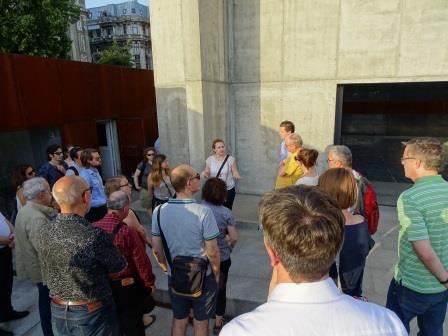 After the long but inspiring meeting, there was time for some small action. The group walked through Bucharest for a visit to the Romanian Holocaust Memorial.
After the long but inspiring meeting, there was time for some small action. The group walked through Bucharest for a visit to the Romanian Holocaust Memorial.
On the days surrounding the General Partner Meeting, several smaller management and working meetings took place. The general feeling at the end of the sessions was one of accomplishment and inspiration to continue with the work.
Photos: ©INSHR-EW
